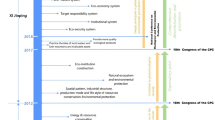Abstract
If perceived from a thematic perspective, Contemporary Chinese fiction harbors a variety of political dimensions. To subvert the conventions of socialist realism, many works in the 1980s joined to affirm the Party’s reform policies, but writers today seem to be keen on the status quo resulting from the economic reform. The fiction of the new century has fully recovered from the sentimental retrospection and naïve, simplistic socialist realism in the decades following the end of the Cultural Revolution. The main characteristic of Chinese fiction in the twenty-first century is its sheer diversity featured by various thematic concerns. Examples of novels can be identified that address issues of globalization, hi-tech, urbanization, marketing economy, internet and poverty and their impact upon the lowly common Chinese such as the disadvantaged rural farmers. This turn to reality gives rise to a burgeoning ecological awareness in Chinese literature. Writers in the new century have diverged from the conventional way to sing along with or speak for the dominant ideology of the economic reform as many did during Deng Xiaoping’s time. They have shifted their attention to the shaded side of contemporary China, writing about the marginalized and reflecting on the social issues that accompany the existing social order. Efforts have been made to explore specific national and regional identities, displaying a reengagement with a realist tradition. It is argued that more and more Chinese, having felt distressed by increasing evidence of environmental deterioration, are now becoming conscious of environmental issues and speaking out about their concerns. This paper then attempts to examine how contemporary Chinese writers contemplate the consequences of China’s explosive capitalist growth and environmental issues in order to fashion their greening dimensions.
Similar content being viewed by others
Notes
Sha (1987, p. 278).
Xu (2005b, p. 276).
Xu (2005b, p. 278).
Xu (2000, p. 79).
Merchant (1989, p. 1).
Wang (2003, pp. 231–232).
Liu (2006, p. 289).
Liu (2006, p. 350).
Liu (2006, p. 351).
Li (2002, p. 27).
Zhang (1996, p. 202).
Quoted in Handley (2009, p. 500).
Yang, Lake-bank Collapse, pp. 17–32.
Wu (2009, pp. 32–37).
Li, Refusing the Doom, p. 2.
Jia (1993, p. 254).
Guo (2009, p. 9).
Guo (2009, p. 17).
Guo (2009, p. 16).
Guo (2009, p. 18).
Guo (2009, p. 19).
Li (2002, p. 23).
Li (2002, p. 26).
Li (2002, p. 25).
Zhang (2003, p. 572).
Zhang (2005, p. 102).
Xu (2006, pp. 249–250).
Xu (2005a, p. 156).
Ye (2004, p. 43).
Carson (2007, p. 238).
Carson (2007, p. 9).
Carson (2007, p. 238).
Yang (2007a, p. 4).
Leopold (1970).
References
Carson, R. (2007). Silent spring. Beijing: Science Press.
Chen, G. (2005). Huihe jingao (Warning from the Hui River). Beijing: People’s Literature Publishing House.
Guo, X. (2009). Sand fox. In The wolf and the fox (pp. 1–19). Beijing: China Youth Press.
Handley, G. B. (2009). The metaphysics of ecology in Marilynne Robinson’s Housekeeping. Modern Fiction Studies, 55(3), 496–521.
Jia, P. (1993). Feidu (The abandoned capital). Beijing: Beijing Press.
Leopold, A. (1970). Foreword. A sand county almanac with essays on conversation from round river (pp. xvii–xviii). New York: Ballantine Books.
Li, S. (1992). Jujue mori (Refusing the doom). Changchun: Chunfeng Literature and Art Publishing House.
Li, C. (2002). Jingshang (The death of a whale). Dahe yimeng (Remaining dreams of a big river, pp. 5–28). Beijing: PLA Literature and Art Press.
Liu, Q. (2006). Red coal. Beijing: The Beijing “October” Arts and Literature Publishing House.
Ma, M. (2001). River flooding sets off pollution alarm. South China Morning Post, August 4, 7–8.
Merchant, C. (1989). The death of nature: Women, ecology, and the scientific revolution. San Francisco: Harper and Row.
Sha, Q. (1987). Beijing Shiqu Pingheng (Beijing out of balance). Pinghengmu shangde tiaoyue (Leaps on the balance beam) (pp. 223–278). Beijing: China News Publishing Press.
Wang, N. (2003). Oumeishengtaiwenxue (Euro-American ecoliterature). Beijing: Peking University Press.
Wu, Z. (2009). Dixia youyu (Underground fish). Zuopin Yu Zhengming (Works and Debates), 347, 26–38.
Xu, G. (2000). Bianyuanren zhaji (Notes from the marginalized). Guangzhou: Guangdong People’s Press.
Xu, G. (2005a). Qingting Dadi (Listening to the land). Chenlun de guotu (The destruction of land) (pp. 153–176). Beijing: People’s Literature Publishing House.
Xu, G. (2005b). lüse xuanyan (A green declaration). Chenlun de guotu (The destruction of land) (pp. 275–315). Beijing: People’s Literature Publishing House.
Xu, J. (2006). Body, earth, and migration: The poetics of suffering in Zhang Wei’s September Fable. Modern Language Quarterly, 67(2), 24–64.
Yang, T. (2007a). Preface. In Y. Tongjin & G. Yuyuan (Eds.), Xiandai wenming de shengtai zhuanxiang (The ecological turn of modern civilization) (pp. 1–4). Chongqing: Chongqing Publishing House.
Yang, Z. (2007b). Huanhu bengkui (Lake-bank Collapse). Beijing: People’s Literature Publishing House.
Ye, G. (2004). Laohu Dafu (Tiger Tai Fook). Xi’an: Taibai Literature and Art Press.
Zhang, W. (1996). Yuanxing zhi zhu (Warning of a long journey). Wuhan: Changjiang Literature and Art Press.
Zhang, W. (2003). Where are you?—dialogues on you are on the highland western suburbs. An Interview with Zhang Wei by Tang Zhaohui. You are on the highland western suburbs (pp. 570–575). Shenyang: Chunfeng Literature and Art Publishing House.
Zhang, W. (2005). Green thinking (Lüse Yaosi). Shanghai: Wenhui Press.
Author information
Authors and Affiliations
Corresponding author
Rights and permissions
About this article
Cite this article
Yang, J. Ecological awareness in contemporary Chinese literature. Neohelicon 39, 107–118 (2012). https://doi.org/10.1007/s11059-012-0137-x
Published:
Issue Date:
DOI: https://doi.org/10.1007/s11059-012-0137-x




